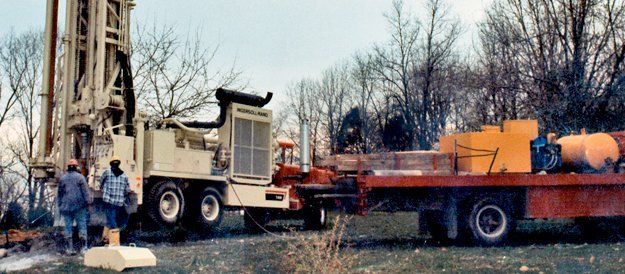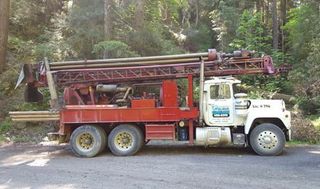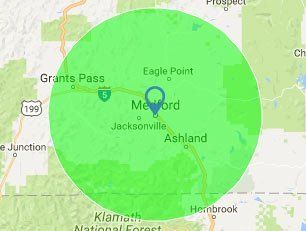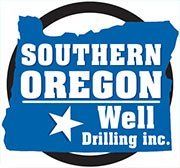Supporting copy for the
Request Service call out button.
FAQS
Well Drilling FAQs
Find the Answers to Your Well Drilling Questions
Explore the well drilling FAQs below to learn more about what we do and how we can help you here at Southern Oregon Well Drilling Inc. If you have any questions or would like to schedule a service, please contact us
today.

Well Drilling FAQs
What goes into drilling a water well?
A water well is more than just a hole in the ground. A properly constructed well includes the well bore, well casing(s), annular casing seal to exclude undesirable water and formations, and, in some applications, a filtration (sand) screen, or liner casing. Area experience, regulations, and geological conditions will determine what exactly is needed for your water well.
How much should I anticipate spending on a water well?
A water well is a long-term capital investment, like your home, and should be treated like one. Costs for a well vary considerably, depending primarily on the depth, diameter, and casing required. We provide free proposals based on your individual well needs and location.
How much water do I need and where should the well be located?
Most household water demands can be supplied by a well production of five to fifteen gallons a minute. Most homes use from two hundred to five hundred gallons a day for internal use. Irrigation usage is beyond these limits. Flows below five gallons a minute are still adequate with additional water storage systems. Pump production rates above fifteen gallons per minute are not desirable for most homes.
Water wells need to be located a minimum distance from all points of possible contamination such as septic tanks, septic fields, petroleum tanks, and animal holding areas. Local ordinances may also dictate well placement. Outside of these setbacks, some geological formations will indicate the best areas in which to locate your future well.
An experienced drilling contractor should be able to assist you in locating a proper place for your future well. To date, there is no cost-effect method of scientifically locating underground aquifers. Water witching or dousing has not produced substantial and verifiable success in locating aquifers. Also, some areas have multiple water-bearing formations with varying qualities and quantities of water.
What is Groundwater?
Groundwater is the major source of the world's fresh water supply. Like surface water, its source is rain and other forms of precipitation. Unlike surface water, ground water does not normally occur in large pools or "underground rivers", but exists in pore spaces between the grains of sand, silt, or clay (alluvium). It also occurs in fractures of less porous underlying rock.
Groundwater generally moves a few inches to a few feet a year from source (recharge) areas to end up in streams, lakes, or oceans (discharge areas). The top of the saturated sediment is called the water table.
How Does a Well Work?
A well is a hole drilled into the ground deep enough to intersect adequate ground water resources. Ground water enters the well and reaches a "static level" water level. Pumping the well lowers the water level in the well in the surrounding zone.
If openings in the water-bearing material are large and interconnected, then ground water flow to the well will be rapid and the well will yield a high level of water. If not, the well yield will be limited, possibly requiring on-site water storage. Well water levels can change daily, seasonally, or over many years, due to variations in recharge and demand.
Well yields in Jackson County vary from less than 1 gallon per minute (gpm) to over 50 gpm (rare). Typically the range in the valley is 5-15 gpm; in the mountains 2-5 gpm.
How Much Water Do I need?
The average family uses 100 gallons per day per person in the winter when water use is less. In the summer, watering lawns and the wasting of water can easily double this demand. Conservation and care can reduce domestic needs by half. Theoretically then, with adequate on-site storage, a family could live on a well producing as little as .5 gallons per minute (720 gallons per day). However, many lending institutions require a minimum of 5 gpm for loan approval to ensure adequate long-term supplies during the period of the loan. Wells for commercial agricultural purposes are rare in Jackson County because of the large amounts of water needed.
How Deep Do I Drill?
Wells of less than 100 feet deep were adequate many years ago. Now a typical new well varies from 200 feet to 400 feet deep in valleys and can exceed 800 feet in the mountains. Generally, the deeper the well, the more chance of finding older groundwater with higher mineral levels. Jackson County has wells exceeding 800 feet that do not yield adequate water. Deepening the existing wells have resulted in poorer water quality in certain areas.
Of course, increasing demands on groundwater supplies (average 40 wells are drilled in Jackson County every month) will eventually influence ground water reserves. A study by the U.S. Geological Survey is now under way to find out more about the status of our groundwater.
What About Well Water Quality?
Well water quality problems come from either contamination from the surface or from underground natural sources. Surface contaminants include nitrate and fecal matter from human and/or animal waste that has entered the well through an inadequately constructed well. Underground sources include fluoride, boron, arsenic, and other naturally occurring elements dissolved into older ground water over time.
New wells should be properly tested for both bacterial and chemical content to verify quality before developing the property. Established wells should be tested annually for bacterial and other probable contaminants. Not all water quality problems can be treated and some water purification methods can run into thousands of dollars.
It is important to seal wells properly to ensure that pollution from the surface does not contaminate the well and surrounding ground water resource. The law requires an abandoned well to be sealed properly to protect ground water from pollution from the surface.
Can Ground Water Contamination Affect My Health?
Yes, several types of well contamination found in Jackson County can cause health problems. Concentration levels of arsenic, fluoride, boron, bacteria, and nitrate that exceed accepted health standards have occurred in Jackson County. Each of these may produce a different health effect. At this time we cannot predict precisely where contamination will occur. Proper well sealing during construction usually prevents contamination from the surface.
Are There Regulations Governing Ground Water Use?
Yes, regulations exist to protect both the ground water resource and the consumer. Ground water is considered "waters of the state" and subject to water laws and permit regulations, including the following:
- Well logs describing the details of new or modified wells have been required of drillers since 1955.
- Drillers must be licensed and bonded.
- Ground water used to irrigate more than 1/2 acre for agricultural purposes must have approved water right filed.
- There are regulations governing well construction, abandonment, and site location.
- Wells serving more than four residences (public water supplies) are subject to water quality and periodic inspection standards.
- A permit is required to drill a well in Jackson County
I Plan to Drill a Well -- Now What?
There are at least two options available. One option is for the property owner to get involved directly. Another is to hire a licensed professional to conduct a ground water study. The first option requires that you find out about the ground water resource data in your area. The water master may have logs on nearby wells and drillers often have direct experience they can share.
The Jackson County Planning Office provides well location assistance. Lending institutions may have well quantity or quality requirements in connection with loans for new constructions or property purchased. Insist on licensed and bonded drillers; check with friends and neighbors about a drillers qualifications. Remember, drilling alone costs more than $10 a foot. A 200 foot well can easily cost several thousand dollars with casings, seal, pump, and plumbing.
There is NO guarantee of either adequate water quantity or quality. It is prudent to be careful and seek advice.
Once a well is drilled, you may want a flow test to determine its yield. A minimum of 4-hour test is recommended. Also, consider having the water quality tested. The County Health Department and local testing labs may help with how to proceed. The cost of water quality and flow testing is usually not included in drilling cost.
Where Can I Go For Help?
Oregon State Dept. of Water Resources- Salem 541-378-3066
Oregon State Dept. of Water Resources Water Master- Local 541-776-7056
Oregon State University Extension Service 541-776-7371
Jackson County Planning Department 541-776-7554
Jackson County Health Dept. 541-776-7316
U.S. Geological Survey 541-776-4256
Rogue Valley Council of Governments 541-664-6674
Southern Oregon Well Drilling Inc 541-621-0081
Prepared and Distributed by the Jackson County Ground Water Advisory Committee
Information and brochure funded by Oregon State University Extension Service
June 1989

Contact Us
for a Full Range of Quality Well Services!
FREE Estimates
on All Services!
All Work is Guaranteed!
541-772-1177
Call usAbout Southern Oregon Well Drilling Inc
Southern Oregon Well Drilling Inc is a locally and family-owned and operated well-drilling business, our families have been operating well-drilling companies since the 1950's.
We guarantee our work.
Licensed, bonded, and insured.
License # 1798
Serving Jackson County and Southern Oregon

Privacy Policy
| Do Not Share My Information
| Conditions of Use
| Notice and Take Down Policy
| Website Accessibility Policy
© 2024
The content on this website is owned by us and our licensors. Do not copy any content (including images) without our consent.
